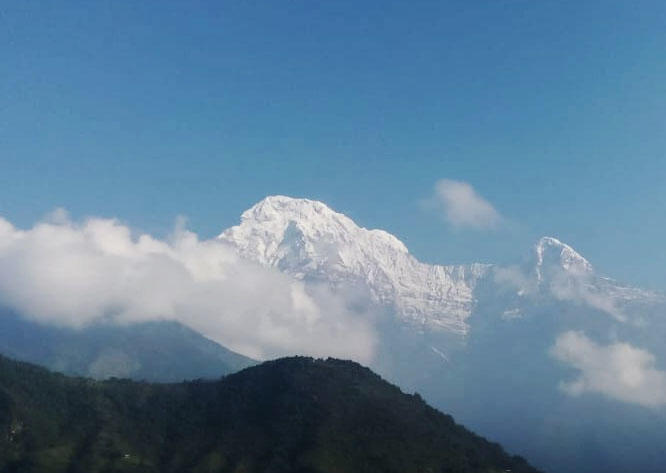PhD student Beas Banerjee has had a first hand experience of how her study will make a difference in the world.

“I felt the first tremors and I thought ‘this isn’t real’… then the second one hit and everyone was frazzled”.
University of Worcester PhD student Beas Banerjee was in a workshop in Nepal discussing how to deal with earthquakes, when the ground started to shake.
“We were on the ground floor, we had to evacuate very quickly,” she said. “I think the irony of it hit us, we were talking about earthquakes, and one actually happened. We were really scared.”
Beas has been carrying out fieldwork in Nepal, looking at ways to make communities in the disaster-prone country more resilient to events like landslides, floods, and earthquakes.
Thankfully, the quake Beas experienced on October 3 was relatively minor but a month later, Nepal would be hit by a quake which would kill 150 people and injure many more.
During Beas’ three-year PhD study, she’s using drone technology to map areas, while carrying out household surveys to assess how vulnerable homes and people will be when disaster strikes.
“We’re using footage from the drones, as well as scoring households,” explained Beas. “It’s so the authorities have that information so if a particular disaster hits, they know which places are the most vulnerable, and where help will be needed in the first instance.”
She continued: “The surveys will help us look at the impact of disasters on people who are underprivileged who might not be able to safeguard their homes or make them more resilient to natural disasters. Also, we’re looking at how well people can ‘bounce back’ from the disaster’s effects; it’s easier for some people than it is for others.”
Throughout the trip she has just returned from, Beas has been looking at what individual communities need, and that’s where the study will make an impact.
“We’ve been speaking to community leaders, using their indigenous knowledge of their vulnerabilities, and finding out what’s actually affecting their lives,” she said. “We’ve been speaking to local NGOs and partners, going in and asking them what they need and want rather than just going in with an outside perspective.”

Professor Alan Dixon is the Director of Studies for Beas’ PhD project, providing help and advice on the strategic direction of the project.
He said: “I think the approach that Beas is taking, integrating household level assessments of vulnerability with data obtained from drones, has the potential to enhance resilience and disaster preparedness in many poor and marginalised areas around the world.”
Looking back at the recent bout of seismic activity in the area, Beas said: “It shows that these studies are needed. Obviously, an earthquake isn’t something you wish to happen but it shows how much of a difference needs to be made there.”
She continued: “Nepal is one of the most earthquake hit countries; it’s a well-known fact. The area I was in sits on the fault line of the Himalayas and these areas are always very unstable, there’ll always be earthquakes or floods, or landslides, it does happen. There were some concerns that I was going into this kind of area but that’s the work I’m doing, if I don’t go, I won’t be able to listen to the people and hear from them about what they’re going through, so I felt it was a risk worth taking.”
Beas has a background in development around the world, having worked with two United Nations organisations in the past. She worked on an environment programme in Jamaica and was part of a project looking at migration in Ukraine which happened to coincide with the early days of the current conflict. Working remotely, she was part of an effort to get third country nationals evacuated.
Beas said she is looking forward to seeing the impact of her study benefiting people living in Nepal. She said “Whenever I do something, I want it to have a direct effect on the lives of people at a community level. Usually, for us academics, the work we do can have effects but we don’t necessarily get to see them but I’m hoping that because of the people we’re working with in Nepal, we’ll be seeing those effects much sooner.”
She added: “Obviously, I want to achieve my PhD but if I can know that I’ve helped even one community, that’ll be enough for me.”
Beas Banerjee’s study, Drones, Development and Disaster Risk Reduction in Nepal will run for three years and is being done in collaboration with Nepal Flying Labs, a non-profit social enterprise which uses drones in the humanitarian sector and mapping and analysis firm NAXA.
For information on courses at University of Worcester visit www.worcester.ac.uk or for application enquiries telephone 01905 855111 or email admissions@worc.ac.uk